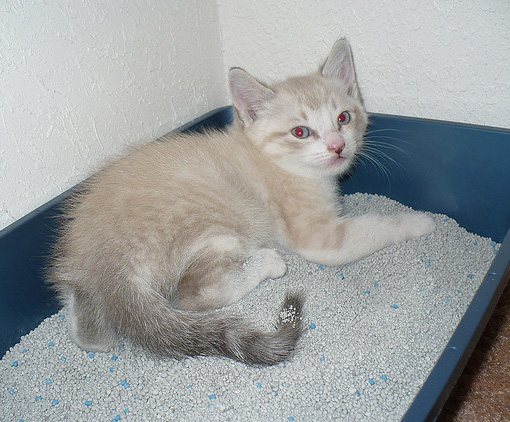Kittens can get in to quite a lot of mischief!
If you are providing kitten care, make sure your home is well-prepared for baby kittens and their antics!
Have you been taking care of kittens from birth that are just beginning to venture out into your home?
Or you are planning to care for a newly-adopted furry baby?
Either way, make sure you have taken the following steps when providing kitten care to ensure her safety and well-being.
Kitten care and providing for her health at home is an extension of the medical care she receives at the vet’s office.
Make sure you know how to take care of her teeth, eyes, ears, and coat.
Learn what constitutes an emergency and what can be remedied with a bit of first aid.
With these kitten care basics in mind, it’s time for discovery for your kitten, and for you too!
Venturing Out
If you are giving kitten care for a little one that you adopted into your family, she may be frightened or overwhelmed by the new sights and smells of your home.
In either situation, it is important for her to have a safe room.
 For the adopted kitten, a safe room simply means a room in your home that is kept quiet, with everything the kitten needs to feel safe and grow comfortable.
For the adopted kitten, a safe room simply means a room in your home that is kept quiet, with everything the kitten needs to feel safe and grow comfortable.
This includes a litter box, food and water, a high quality cat scratching post or tree, and the time to adjust to a new place.
If you have children or grandchildren in your home, take care that they don’t crowd her, as this can make her nervous.
Let them be a part of the care routine, and they will be even more eager about protecting her too!
Visit her in her safe room and quietly pet her, talk to her, and play if she is interested.
Let her decide when she wants to explore more of the home, but take care that your home is safe for her to do so.
If you have been providing kitten care since their birth, you will notice that by the time they are around four weeks old, they will be very rambunctious and curious.
They will already be familiar with their safe room (or nesting room) and may not be as shy about wanting to explore beyond the boundaries that they have gotten used to since they were tiny.
If you think they are ready to have a big living-room adventure, make sure you are prepared!
Providing Kitten Care by “Trouble-Proofing”
The first thing you need to do before you open the floodgates of furry kitten anarchy, is to get down on your belly all around your  house to see what they see.
house to see what they see.
You might be surprised how your home looks from this viewpoint!
For Safety’s Sake: Eliminate such dangers as dangling cords from window blinds, exposed cables, and possibly toxic houseplants.
Also make sure you don’t have holes in your home or basement walls from plumbing repairs, etc.
Make sure that they can’t get into your cabinets, washer/dryer, through an open window, the underside of a mattress (sometimes the springs will be exposed) or under a reclining chair.
If they get into something messy, make sure you are prepared to give a kitten bath!
There are many other possible dangers that could be mentioned when providing kitten care, but this gives you an idea of where these inquisitive little beasties may be inclined to go!
As a kitten care giver, just be thorough and use your common sense.
If this is overwhelming, just allow access to one or two new rooms at a time.
For Your Home: If you have determined that the kittens can’t get into much trouble, now assess your valuable home goods!
Are there vases or picture frames that could be knocked over? Area rugs to be attacked, chewed, and scratched into threads?
Responsible care also means living in harmony with them!
Put fragile and valuable pieces out of reach, and make sure they don’t get naughty with everything else!
Make sure you give them weekly nail trims to help prevent furniture damage and accidental scratches.
You may be thinking of declawing your kitten but please don’t elect this surgery without knowing exactly what it entails.
If you see them pursuing an unwanted behavior, see the article on kitten training to learn how to redirect the kittens’ behavior.
Kitten-Sitting
 Even after you have eliminated (or think you did!) all of the potential dangers, please do not leave the kittens unattended in your home!
Even after you have eliminated (or think you did!) all of the potential dangers, please do not leave the kittens unattended in your home!
If they are very small, you will not believe how easy it would be for one to get lost if you are not looking.
Even older kittens can get hurt if you are not watching them.
These eight to nine-week old kittens are show-offs, and will try to climb to the top of your refrigerator or cabinets if they think they can!
Use your best judgment as to when you can leave a kitten on his own to have the run of the house, but if you are providing kitten care to little ones that are just learning to explore, it is best to keep them in their safe room when you are not around.
This is especially true if you have other pets! Take care that if you have dogs or other cats in the home, they are properly introduced to the kittens before you leave them in the same room.
Taking Care of Outdoor Kittens
A decision to keep kittens and cats contained to the indoor environment only or to let them outside is a personal choice for kitten owners.
Statistically, cats and kittens that are allowed to go outside (or stay outside) have a shorter lifespan due to diseases, fights with other cats, predatory animals, or being hit by cars.
The lifespan of a cat is greatly increased by keeping them indoors.
These statistics do not apply to every situation, however, and there can be some situations and environments that do not present these dangers, so use your best judgment for your household’s situation and kitten care routine.
This being said, when providing kitten care, there are extra precautions that should be considered if you want them to be able to go outside.
We would strongly suggest that kittens not be introduced to the outdoors until they are several months old.
When you do first introduce kittens to their backyard, they should not be left outside unsupervised.
Just like their first ventures into your home, you want to make sure your yard is kitten-proofed before they go exploring.
And don’t think your fence is too high for them to climb either! Watch them carefully to make sure they don’t get to where you can’t reach them, whether it’s up a tree or under a fence.
The kittens may actually get frightened of this big open place, and will try to hide.
It is important to make sure you are able to gather the kittens to bring them back inside before nighttime temperatures drop and predatory animals (including owls!) come out on the hunt.
If you do decide that your kitten will grow to be an indoor/outdoor or outdoor-only cat, you will also have to consider a more strict vaccination schedule, as well as protection against fleas and ticks.
If you decide to keep your kitten indoors, you have much less to worry about, except maybe more frequent litter box cleanings!
If you are worried about your kitten getting bored or just feeling “cooped up,” and you feel that you are not being a good kitten care giver, you may just be projecting your own feelings onto your kitten.
If you set aside time to play games with your kitten each day and have a sleeping spot set up underneath a sunny window, your kitten will will be very happy indeed (and lucky compared to so many kittens that have no roof to sleep under!)







